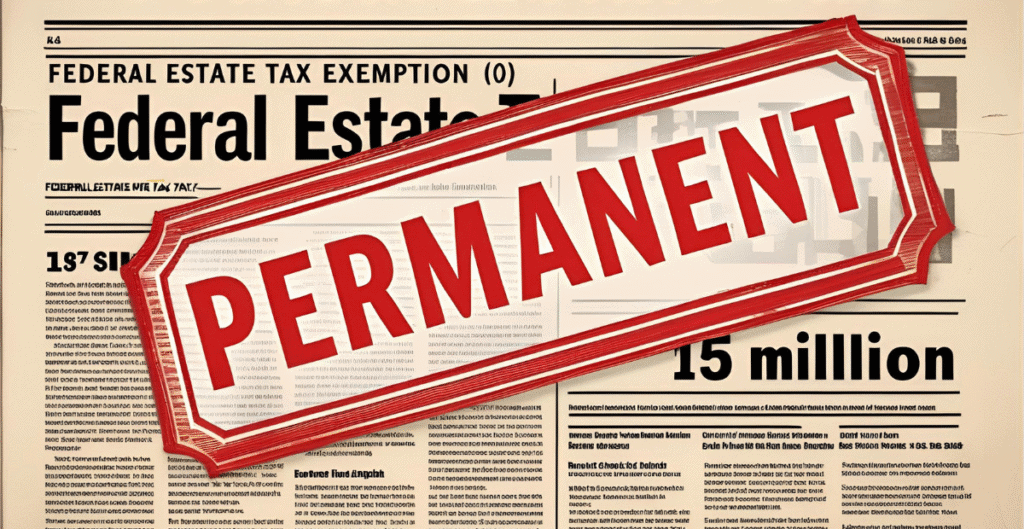On the fourth of July, there was a major new tax law enacted which re-introduces a permanent federal estate tax exemption. The new law appears under the One Big Beautiful Bill (OBBBA) and will result in the federal gift and estate tax exemption being set at $15 million per individual starting in 2026, and then indexed for inflation going forward.
There was no change to the estate tax rate. Transfers in excess of $15 million are still taxed at a 40% rate. Additionally, there is still portability between spouses. Accordingly, a married couple can pass on $30 million starting in 2026. It should also be noted that the GST Tax exemption amount will also be set to $15 million per individual, indexed for inflation.
In order to understand the new law and its consequences, it would be helpful to understand the tax laws before there was a permanent federal estate tax exemption. Under the Tax Cuts and Jobs Act (TCJA, effective 2018–2025), the federal estate and gift‑tax exemption was $10 million per individual, indexed for inflation, but scheduled to sunset to 2017 levels at the end of this year. This would have resulted in an exemption of approximately $5 million per person, but indexed for inflation.
The biggest issue with not having a permanent federal estate tax exemption is that it made estate planning unnecessarily complicated. Accordingly, for many years, estate planning attorneys like myself have had to grapple with how to navigate the possible sunset. Some clients have decided to take a wait and see approach, while others have created plans designed to maximize their exemptions should the law sunset.
All this of course begs the question of whether or not this affects you. If a permanent estate tax exemption affects you, then you should consider whether or not you should you change your estate plan.
Does a permanent federal estate tax exemption affect you?
In all likelihood, if you have assets under $5 million, regardless of whether you are married or single, the new law probably does not affect you. That being said, if you have old estate planning documents, you should still have them reviewed to ensure that the tax formulas in your documents work properly. This is particularly true if you are married. There are many older Wills and Trusts out there designed to soak up the federal estate tax exemption by creating a credit shelter trust on the first to die. The downside to this formula is that, upon the death of the surviving spouse, your heirs will likely have a higher capital gains tax burden.
If you have assets in excess of $60 million, in many ways, this change may not affect you either other than buying you more time to plan if you haven’t done so already. Most likely, if you have significant assets, you have already created and funded one or more irrevocable trusts. This still makes sense to do under the new law as you are still well over the permanent federal estate tax exemption amount.
If you have assets above approximately $10 million and you are single, or if you have assets above approximately $20 million and you are married, unless you are very confident that your wealth isn’t likely to grow above the exemption amounts, it probably will still be beneficial to consider more comprehensive estate and trust strategies.
The biggest change is honestly for those with assets less than about $10 million for individuals and about $20 million for couples. The reason for this that it was super difficult to know whether or not to create sophisticated estate planning documents. There were two major decisions to always consider – (1) whether the estate tax limit would drop, and (2) how much would a client’s wealth would grow. Now that there is a permanent federal estate exemption, the biggest item to consider is simply how much a client’s wealth will grow. Accordingly, for clients who have wealth below these thresholds, you can probably stick with a more simplified approach.
As a reminder though, even if there is a permanent federal estate tax exemption, there may be state estate or state inheritance tax laws which require more sophisticated planning and the need to set up irrevocable trusts.
Changes you should consider to your estate plan now that there is a permanent federal estate tax exemption
So now that the there is a permanent federal estate tax exemption, what changes should you consider to your estate plan?
- Revise old credit shelter/marital trusts (A/B Trusts, QDOTs) – as mentioned, if you have older estate planning documents, you may have old tax formulas built in to your documents. The higher permanent federal estate tax exemption helps with estate and gift taxes, not capital gains tax issues. Accordingly, it is beneficial to have these reviewed and updated.
- Revisit ILIT death benefit amounts – Perhaps you have an existing Irrevocable Life Insurance Trust (ILIT). These are not completely pointless even with a higher permanent federal estate tax exemption. However, you may not need as much liquidity or life insurance when you pass. Consider having the policies reviewed to see if you can reduce change the policy to better reflect your current needs. Many people would prefer to reduce or stop paying the premium. You can often do this by reducing the death benefit.
- Exercise swap provisions in irrevocable trusts – Did you know that most provisions in irrevocable trusts let you do a tax free swap assets? For example, you swap $10 million of highly appreciated stock in a trust for $10 million of cash. The reason to do this is so that you get the stock back in your name so that it receives a step-up in basis upon death while still sheltering the $10 million from the estate tax. A careful review of the trust should be done before exercising this power.
- Implement trust decanting provisions – A trustee could shift trust assets into newer trusts better optimized for the permanent federal estate tax exemption.
- Stronger focus on asset protection, minimizing capital gains taxes, and minimizing taxes from Retirement Accounts – Generally, most estate plans can now focus on protecting your assets and minimizing other taxes rather than having to keep a 40% federal estate tax in mind when planning.
Other Changes made by the OBBBA
In addition to establishing a permanent federal estate tax exemption, the OBBBA also enacted a number of other important changes in the law. Most notably for those of you who live in high tax states, they increased the State and Local Tax (SALT) limits from $10,000 per household to $40,000 per household. Accordingly, you will now be able to deduct a significantly larger amount of those taxes on your federal income tax returns. However, this is not permanent and there is a phaseout.
For a detailed review of all the other major changes to the tax laws, consider reviewing this article by the Tax Foundation.
Conclusion
The estate planning attorneys at The Pollock Firm LLC are always happy to assist if you have any questions about your Wills and Trusts, asset protection, probate, or if the permanent federal estate tax exemption affects you. Please let us know if we can assist.



